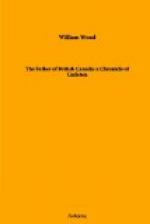There was a third alternative: no less than the establishment of a regular Dominion of British North America in 1790, a step which might have saved much trouble between that time and the Confederation of 1867. William Smith was its strongest advocate, Carleton its most cautious and judicious supporter. The chief justice was in favour of federating Upper and Lower Canada with the Maritime Provinces and Newfoundland into a single dominion. Each of the six provinces would have its own parliament under a lieutenant-governor, while there would also be a central parliament under a governor-general. Carleton forwarded the suggestion to the home government; but he nowhere committed himself to any very definite scheme. His own preference was for keeping the existing province of Quebec a little longer, then dividing it, and afterwards drawing in the other provinces. The chief justice preferred to make a constitution. The governor preferred to let it grow. The home government’s preference could not be stated better than in Grenville’s dispatch to Carleton of the 20th of October 1789: ’The general object is to assimilate the constitution to that of Great Britain as nearly as the difference arising from the manners of the People and from the present situation of the Province will admit. ... Attention is due to the prejudices and habits of the French Inhabitants and every caution should be used to continue to them the enjoyment of those civil and religious Rights which were secured to them by the Capitulation or which have since been granted by the liberal and enlightened spirit of the British Government.’ Except for its rather too self-righteous conclusion this confidential announcement really is an admirable statement of the ’liberal and enlightened’ views which prevailed at Westminster.
The bill, postponed in 1790, was introduced by Pitt himself in the House of Commons on the 7th of March 1791. Sixteen days later Adam Lymburner, a representative merchant of Quebec, whom Carleton described as ’a quiet, decent man, not unfriendly to the administration,’ pleaded for hours before the committee of the House of Commons against the division of the province. All the English-speaking minority in the prospective province of Lower Canada were afraid of being swamped by the French-Canadian vote, and so of being hampered in liberty and trade. The London merchants naturally backed Lymburner. Fox opposed the bill as not being liberal enough. Burke flared up into the speech which led to his final breach with Fox. Pitt, the pilot who was to weather far greater storms in the years to come, eventually got the bill through both Houses with substantial majorities. On the 14th of May it became law. Quebec and Ontario were parted for good, notwithstanding the legislative union of fifty years later.




